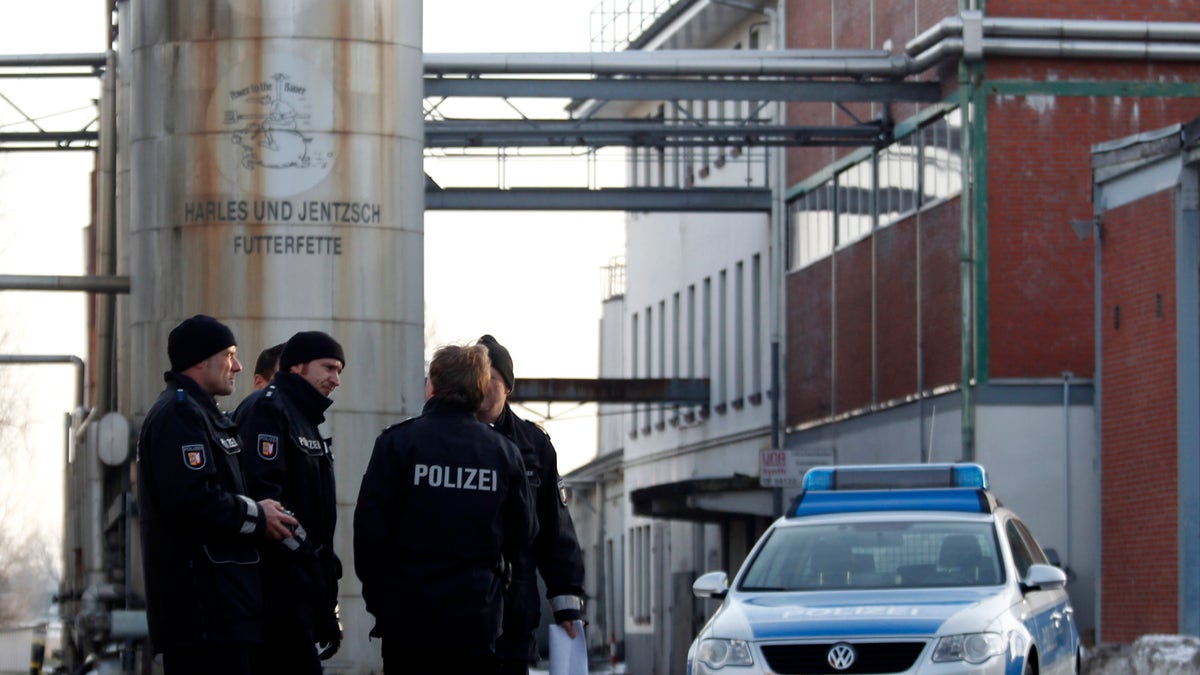
Jan. 5, 2011: In this picture, police stand in front of an animal feed products company in Uetersen, northern Germany that was searched and temporarily closed by authorities. German authorities have stopped more than 4,700 farms from selling their meat and eggs as a precautionary measure against a growing scandal over animal feed contaminated with cancer-causing chemicals that is also affecting exports. Authorities believe some 150,000 tons of feed for poultry and swine containing industrial fat have been fed to livestock across Germany. The fat contains dioxins and should not have been in the food.
BERLIN -- Germany halted sales of poultry, pork and eggs from more than 4,700 farms Friday after animal feed was contaminated with cancer-causing dioxin, while authorities elsewhere rushed to figure out how far the tainted food had spread.
South Korea and Slovakia on Friday banned the sale of some animal products imported from Germany, while authorities in Britain and the Netherlands were investigating whether food containing German eggs -- like mayonnaise or liquid egg products -- was safe to eat.
Prosecutors in the northern state of Schleswig-Holstein have launched an investigation into the German firm Harles & Jentzsch GmbH, suspecting the company knew but failed to tell authorities that fat it had produced for use in feed pellets was tainted with dioxin.
Test results released Friday on the fat showed that some of it contained more than 77 times the approved amount of dioxin, the state's agriculture minister said. Out of 30 samples tested so far, 18 contained more dioxin than legally allowed.
Dioxins are contaminants that typically result from industrial combustion and other chemical processes. Exposure to dioxins at high levels is linked to an increased incidence of cancer.
Authorities believe 150,000 tons of feed pellets for poultry and swine may contain the contaminated industrial fat produced by Harles & Jentzsch. They are trying to determine how widespread the contamination may be and how long the tainted feed has been in circulation.
The scandal broke after regular random testing revealed excessive dioxin levels in eggs from chickens in the west of the country earlier this week. More than 8,000 chickens were ordered slaughtered and tainted food fears spread to Germany's famous pork industry.
Germany's Agriculture Ministry said Friday it had no immediate reports of health problems connected to the contaminated food, but it was stopping the sale of products from certain farms as a precaution until more tests could be carried out. About 1 percent of the country's farms have been affected so far.
"This strategy is resulting in a high number of closed farms, which in the course of testing and clarification in the coming days will be reduced," Agriculture Minister Ilse Aigner said.
Test results are expected shortly on whether traces of dioxin have been found in milk or meat in two of the German states where the contaminated feed was delivered, Agriculture Ministry spokesman Holger Eichele said.
According to the most recent tests on eggs from farms where chickens consumed the contaminated feed, "two-thirds have been clean and about one-third have been right on the border of what is considered dangerous," he said.
Chris Elliott, an expert in food safety at Queens University, Belfast, said so far the danger to consumers appeared to be limited.
"The concentrations detected in this case are above the legal tolerance limits, but only just. That tells you that the potential risk of harm from these eggs is very low," Elliott said.
In Brussels, the European Commission said it was "closely monitoring the situation with the German authorities."
In 1999, dioxin from motor oil was mixed into animal feed in Belgium, leading to widespread import bans and food being pulled from the market. The scandal prompted the European Union to establish maximum levels for dioxins in livestock feed in 2001.
Geert De Poorter, lab director general at the Belgian food safety agency, told The Associated Press he didn't believe the German feed scandal would be damaging to public health.
"If we assess the figures we've got from Germany regarding tainted products and we extrapolate that to compare with the Belgian crisis, then we have a rough estimate of 50 to 100 times (less)," De Poorter said.
He further noted that measures to prevent such scandals have been considerably strengthened since Belgium's dioxin scare, when Europe had virtually no controls and tracing tainted products took weeks, not days.
German farmers are demanding compensation for losses they are estimating at up to euro60 million ($79 million) a week, but Eichele said it was still too early to determine the overall damage.
"We first need to find out what led to this," Eichele said. "It needs to be cleared, then we need to see how severe the damage is and then how we can best help those farmers."
